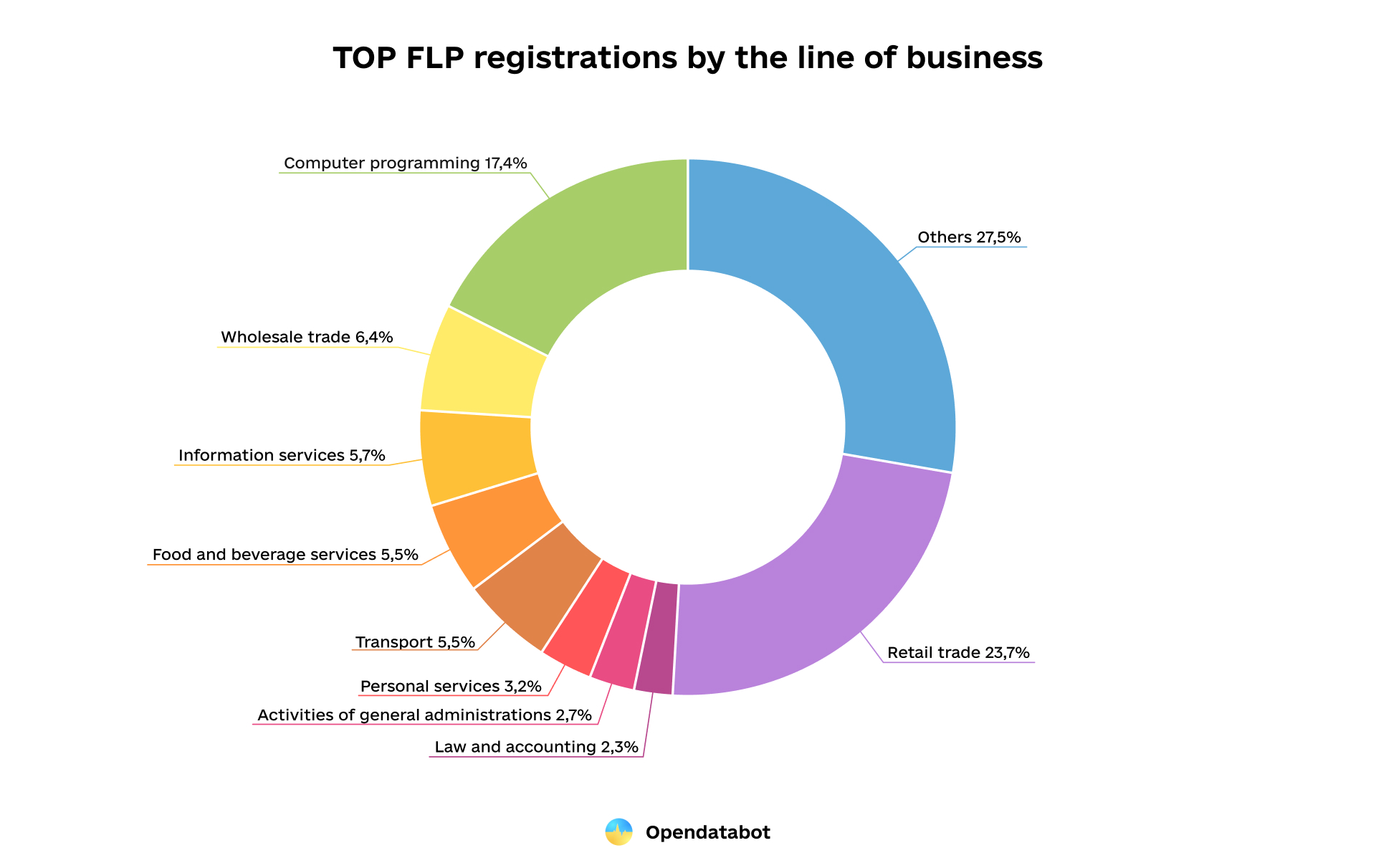In this article, we are talking about the issues that Ukrainian businessmen have faced following Russia's full-scale invasion of Ukraine in February 2022
Russia's full-scale invasion of Ukraine in February 2022 changed the rules of doing business. The war, which has engulfed much of the country, has forced entrepreneurs to adapt to the new conditions as quickly as possible. In our article, we describe what Ukrainian businessmen have faced and how the fighting in Ukraine has affected business in the country and around the world.
How business developed in Ukraine before the war
In 2021, 37,975 new companies and almost 270,000 individual entrepreneurs were registered in Ukraine. According to the Opendatabot service, trade was the most popular business activity among businesses. In 2021, 23% of all companies were engaged in trade.Ukrainian e-commerce has also been growing strongly in recent years. In 2020, the market size reached $4 billion, representing 8.8% of total retail sales. Moreover, the market has almost tripled in the last five years. Analysts predicted that the growth should have continued, but the full-scale war with Russia disrupted all the positive dynamics.
What challenges companies encountered at the start of the war
At the beginning of a full-scale invasion, business owners found it difficult to know what to do and what decisions to make. It was a complex and confusing situation. Major multinational companies shut down immediately, all shops and shopping centers were closed, many were confused, and only a few supermarkets were open.
The fighting, covering a substantial part of Ukraine, disrupted the domestic transport system, and warehouses and terminals of some logistics operators were destroyed. While small companies tried to deliver orders themselves, it was an impossible solution for large companies. International logistics had ceased to function during the first days of the war - flights had ground to a halt, and seaports had become blocked. The supply of goods had become a matter of road transport, which was considerably more expensive and time-consuming than traditional supply chains.
Another serious problem has been that not all entrepreneurs have retained access to warehouses. Some warehouses were located in occupied territory or near the front lines. At the time, it seemed that doing business in Ukraine would be extremely difficult or impossible. Many predicted massive company closures, but within weeks the situation had changed.
How Ukrainian businesses managed to return to work
In March 2022, the Ukrainian authorities began encouraging businesses to return to work if they were in relatively safe regions. It was an important milestone for the country, which ensured Ukraine's transition to a wartime economy. Businesses fill the treasury by paying taxes and providing jobs and essential goods or services for the people. Thus, by resuming operations, Ukrainian companies supported the economy.
Over time, the situation with domestic deliveries has improved. Logistics operators began to open branches that had been closed in the early days of the war. At first, parcels were delayed, but gradually the delivery time decreased and eventually returned to the pre-war level.
According to statistics from Nova Poshta, one of Ukraine's leading logistics operators, during the first week of the war, the volume of deliveries fell from 1 million items per day to 50,000. This drop is directly linked to the shutdown of online shops and marketplaces. During the second week of the war, Nova Poshta's figures began to rise. By the end of March, the company was already carrying 350,000 parcels daily, 60% of which were internet orders.
Small businesses played an essential role in the improvement. Small companies proved to be more agile in their decision-making and could return to work faster than larger companies. For example, some retailers did not have to relocate a warehouse because their range consisted of small goods stored at home. It allowed work to resume within a week of the outbreak of war.
How the situation in Ukraine has affected business globally
The consequences of the war in Ukraine have been felt around the world. For example, supply chains for goods and food have been disrupted, due to the occupation or blockage of Ukrainian ports in the Black Sea. Reduced imports of maize, wheat, rapeseed and sunflower oil from Ukraine are affecting the EU food industry. At the European Council meeting on 23-24 June 2022, EU leaders stressed that the responsibility for the global food crisis lies solely with russia. The Europeans called on the Russians to immediately stop shelling agricultural facilities.
In terms of trade, the biggest consequence of the war is the rise in commodity prices. Significant price hikes have affected international markets. The result has been higher inflation worldwide. In the aftermath, this situation can cause changes in demand as consumers are unwilling or unable to buy what they would normally buy. According to the World Bank report "The impact of the war in Ukraine on global trade and investment", global trade will fall by one per cent, resulting in a fall in global GDP of just under one per cent.
What happens to the business in Ukraine at the end of 2022
Even though active hostilities continue, the expectations of Ukrainian business people are optimistic. Businesses have been able to adapt to operating in war conditions and cope with many difficulties, including one of the main problems - power cuts due to Russian shelling. Ukraine has proved that it is not always easy to continue doing business in times of war, but it is possible.
The Ukrainian service Opendatabot has been collecting statistics on businesses since the start of the full-scale invasion. Open data shows that since February, almost 170 thousand new entrepreneurs have been registered, which means that people are not afraid to start a business. Apart from individual entrepreneurs, legal entities are also registered - for example, in November, the Ukrainians opened 2,600 companies. And the most popular field of activity for entrepreneurs remains retail trade.

Major global companies, which stopped operating in Ukraine at the start of the war, are slowly beginning to return. However, some brands have not yet announced when they will resume operations. The demand for different groups of goods in Ukraine remain very high. Ukrainians continue to live and buy necessary things for themselves and the army. The absence of some big brands on the market opens new opportunities for small businesses. Ordinary business is not stopped, even by closed airlines and overloaded customs.
Conclusion
The Ukrainians are already preparing for victory and plan to rebuild what was destroyed by the occupiers. Demand for many categories of goods is predicted to increase, which means that Ukraine has proved that business is possible during the war.





